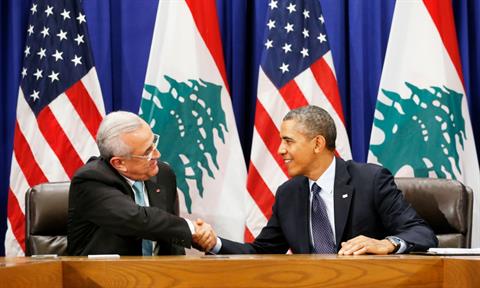
President Barack Obama praised Lebanon on Tuesday for its generosity in welcoming refugees fleeing the crisis in neighboring Syria and pledged tens of millions of dollars in aid to help offset the costs of the crisis.
Obama met Lebanese President Michel Suleiman on the sidelines of the United Nations General Assembly just after the U.S. leader announced $339 million in additional humanitarian aid in response to Syria’s crisis, including $74 million for Lebanon. Obama also announced the U.S. was sending $8.7 million to help Lebanon’s military protect its borders against terrorist threats and illicit goods.
Suleiman said Lebanon, with a population of about 4.5 million, has had a difficult time dealing with the influx of refugees. He estimated that at least 1 million Syrian refugees are in Lebanon, with thousands more crossing over each week.
That burden on Lebanon will be the focus of a meeting Wednesday on the sidelines of the General Assembly. The meeting of the International Support Group for Lebanon will draw donors and others to discuss the dimensions of the crisis.
The Washington-based World Bank has concluded a quick assessment at the request of the Lebanese government to determine the economic and social impact of spillover from the conflict in Syria and the financial resources Lebanon will need to cope with it. It was done in preparation for Wednesday’s meeting.
Lebanon faces billions of dollars in lost economic activity, and the massive influx of refugees is overwhelming public services and risks driving up unemployment and poverty rates, according to the assessment.
World Bank President Jim Yong Kim met Suleiman on Tuesday to begin work on a plan for coping with the Syrian spillover. He thanked Lebanon for its generosity and discussed how the World Bank and the international community can do their part so that Lebanon does not shoulder the costs alone, according to a World Bank statement.
"We now have a clear picture of the costs Lebanon faces for sheltering nearly a million refugees fleeing the fighting in Syria," Kim said.
The assessment covered the period of 2012-2014 and is meant to both guide government policy and provide a basis for coordinating global support.
It concluded that Syrian refugees in Lebanon could reach 1.3 million by the end of 2013.
"If the conflict continues, there could be as many as 1.6 million refugees in Lebanon by the end of 2014," said Inger Andersen, World Bank Vice President for the Middle East and North Africa region.
The demand on public services has surged along with the population. If things continue on the same course, rising demand will drive up government expenditures by an estimated $1.1 billion for 2012-2014. Government revenues are expected to drop by $1.5 billion because of interrupted trade and an erosion of business and consumer confidence, the assessment found.
More than 170,000 Lebanese will be pushed into poverty by 2014, and unemployment could double to more than 20 percent over the same period, the World Bank said.
Up to $1.6 billion will be needed to maintain the quality of social safety nets and health and education systems, and to restore access to pre-crisis levels, according to the World Bank report. In addition, services such as electricity, waste management, transportation and water will need additional investments to meet the needs of the Lebanese population and the refugees.



